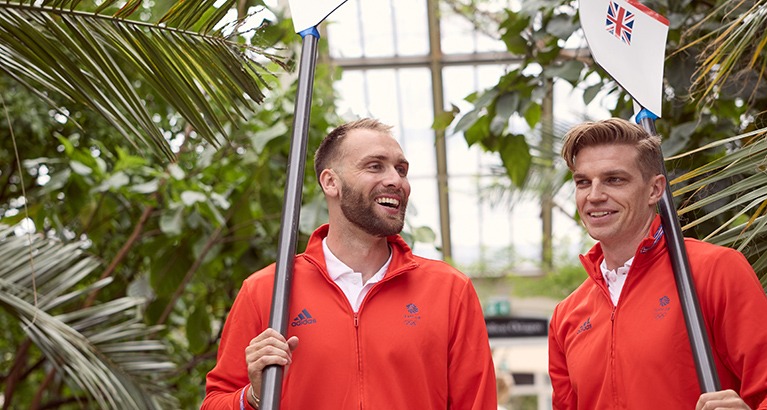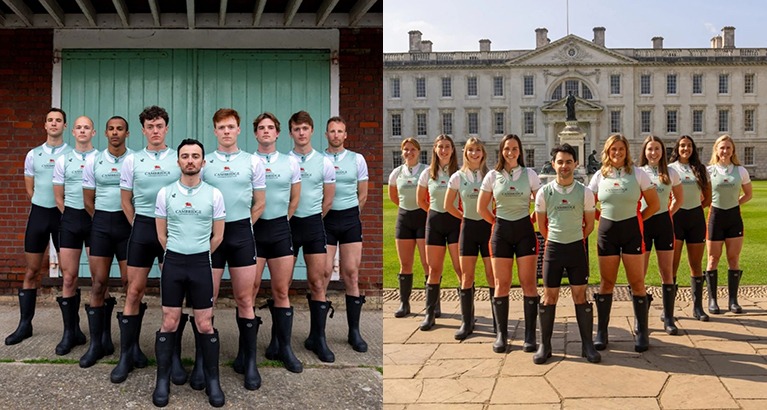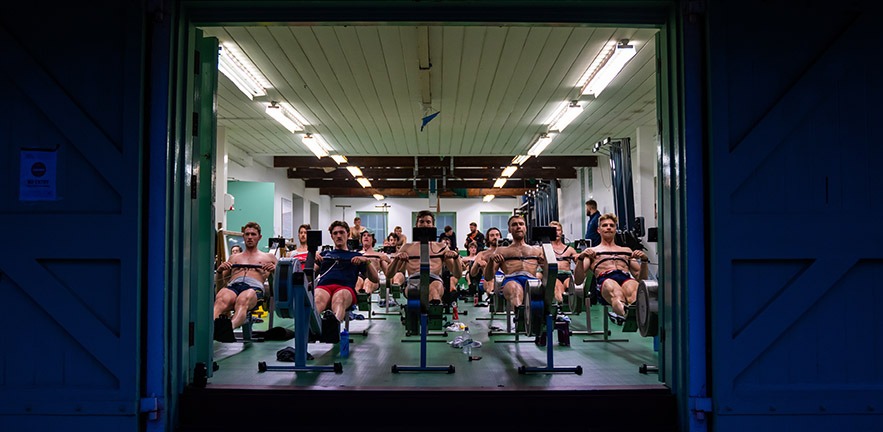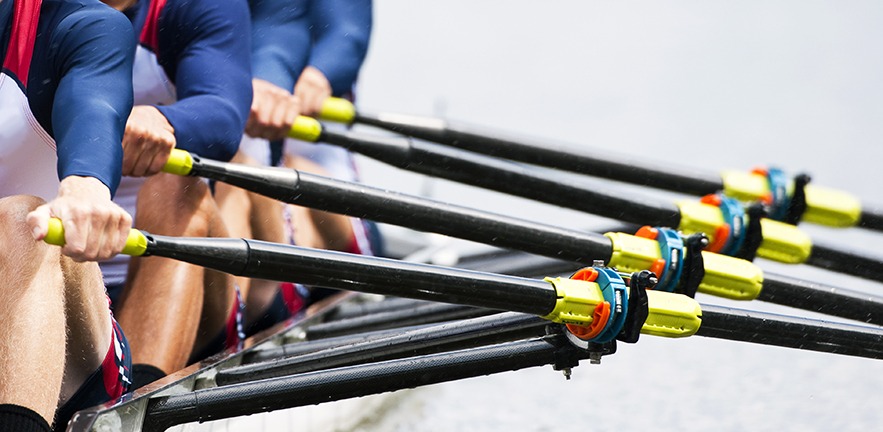Olympic training and focus ahead of Paris 2024
Ahead of the Games of the XXXIII Olympiad, this year held in Paris, we caught up with MBA alumnus Ollie Wynne-Griffith, as he headed into the months of training required to represent Team GB on the world stage.
Ollie Wynne-Griffith is no stranger to the Olympics and Olympic pressures: he was part of the Team GB Eight boat that took a bronze medal in Tokyo, the Olympics that were held a year after planned in 2021, with many restrictions still in place post-pandemic.
In the 3 years since standing on that podium in Tokyo, Ollie enrolled on the Cambridge MBA, joining the Class of 2021/22 and graduating in 2023. But rowing has remained a constant throughout: as a student at the University of Cambridge, and a member of Peterhouse, one of the oldest of the Cambridge Colleges, Ollie joined the Cambridge University Boat Club (CUBC) and competed in The Boat Race in March 2022, during his MBA year.
As an elite rower, Ollie and his Peterhouse teammate Tom George, who studied for an MPhil in Real Estate Finance at the University of Cambridge, continue competing in the annual cycle of races, from the European Championships to the World Championships, with all roads leading to Paris. The British Pair recently won Gold in the European Championships, winning a second Gold in Lucerne at the World Cup II in May.
Competing as a Pair in the 2024 Summer Olympics
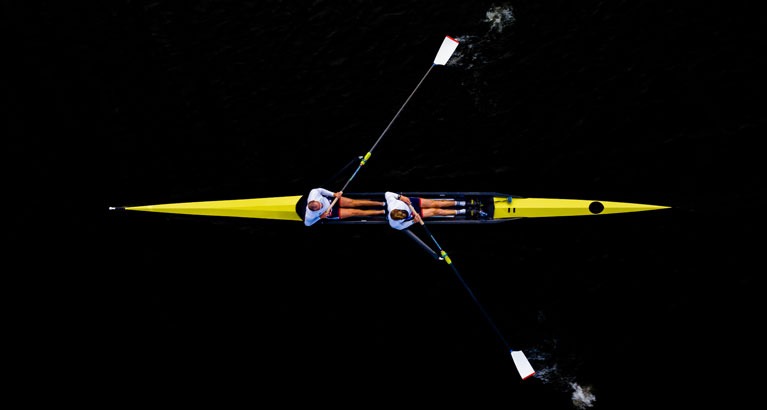
We asked Ollie why he chose to compete as a Pair for this Olympics rather than the Eight:
“I really enjoyed my time in the Eight and I do still miss it. But the Pair has been really rewarding, we know each other really well, we went to school together, played rugby together, we have known each other since we were teenagers, and so the communication side of things is just really simple. I always describe the Eight as a party and when you get down to a Pair, it’s more like a marriage.”
He continued “The Pair is definitely, in my eyes, the art form in rowing. Thinking of the names that have gone before, (Matthew) Pinsent and (Steve) Redgrave rowing for Team GB, who won the last gold medal as a Pair in 1996, James Cracknell, legends of the sport, who have left their mark on the sport.”
“The Pair is one of the hardest tests of the skill, when you sit on the start line there is nowhere to hide. When it goes well you can feel that it was ‘just the two of us, we did that for us’, and then on the flip side when it doesn’t go so well the level of accountability is pretty brutal.”
Olympic rowing: a physical but also mental challenge
“This has been a really rewarding challenge to take on, doing the Pair in the second Olympiad has challenged me as much mentally as it has physically, which has been really motivating coming back into the training required for this Olympiad, it invigorates me to turn up and train every day.”
“Training on the freezing cold Thames (River) in Henley has had its challenges, the water levels have been very high across the winter, and you are often wading in in 5-degree temperatures.”
“But the level of accountability with your team is always there and the rest is discipline. I have been on the team for 7 years, training 6 to 7 days a week and you know every single session is not going to be sunshine and rainbows, but you know that the training you are doing every day is going to be worth it.”
“It is part of changing the mentality, change the psyche – you always know you can take one more stroke and you can always do one more kilometre. If you have that kind of attitude, then you know you are going to get what you want at the end of the year.”
Why success is not decided in a 6-minute period
“At the last Olympics I was quite focused on the medals, the end goal, but I have come to realise that success is not decided in a 6-minute period at the end of the year. You decide instead if the year is a success based on the success of every single session you do.”
“Tom and I genuinely enjoy spending time with each other, it is a shared pursuit, training every single day and believing that we have a chance of winning and doing everything that we can to maximise those chances.”
As the Olympic days come closer, he concludes: “whatever happens we can leave with no regrets and have enjoyed the process. That day is just a day where we get to show all the successful work we have done”.
Whatever happens we can leave with no regrets and have enjoyed the process. That day is just a day where we get to show all the successful work we have done.
Why an MBA for an Olympic athlete
Ollie studied for his undergraduate degree in Political Science in the US, at Yale University. After returning to the UK and making Team GB ahead of Tokyo, Ollie then looked to stay in the UK for his MBA.”
Looking at why an MBA and why Cambridge, Ollie replied “There is always the search for a way to transition away from sport. The conversations I had with individuals and with the Business School before choosing Cambridge were just really remarkable. The Boat Race (the annual race between Cambridge and Oxford universities) had also always been on my wish list and so that narrowed it down to just two choices really.”
“I met Rob Baker, the Head Coach at Cambridge University Boat Club (CUBC) and I think it’s a relationship that I just didn’t expect to leave Cambridge with before going in. He’s probably one of the first people that I now pick up the phone and ask for advice.”
Ollie also spoke to Cambridge Judge Professor Mark de Rond after CUBC put them in touch. “Every single conversation I had at Cambridge, before coming here, was about ‘we value you and your life experience’ and I really felt that I was turning up exactly as I am. My gut reaction was so positive that I couldn’t not go to Cambridge. I knew I would feel valued for who I was in the class.”
Every single conversation I had at Cambridge, before coming here, was about ‘we value you and your life experience’ and I really felt that I was turning up exactly as I am. My gut reaction was so positive that I couldn't not go to Cambridge. I knew I would feel valued for who I was in the class.
Juggling the annual Boat Race with MBA coursework
We asked Ollie what it was like training for the annual Boat Race, that takes place every March/April, during his MBA year.
“Training for the Boat Race alongside the MBA year was hard, it was busy, really busy. I don’t think I could have done it without some of the course content being online alongside the in-class teaching. I also had to streamline the year a little bit, so there were things that I missed in the year that I would like to have done in another life!”
“Somehow, I managed to create more hours in the day than were possible. But I often couldn’t join the evening events as I had to be in bed by 9 pm to get up and go training early in the morning.”
Bringing his whole self to the MBA year, Ollie expands, “I hit campus on day one feeling valued for who I was and what I had done. The Cambridge community really valued what I was bringing to the cohort. I didn’t feel like an imposter but rather my skillset and experience as an Olympic rower was as valuable as the next person’s experience”.
I hit campus on day one feeling valued for who I was and what I had done. The Cambridge community really valued what I was bringing to the cohort. I didn't feel like an imposter but rather my skillset and experience as an Olympic rower was as valuable as the next person’s experience.
An amazing support system from the whole Cambridge community
“After the Boat Race, Tom George and I realised pretty quickly that we were not done rowing. But the MBA team were really supportive of my rowing career: they were like ‘if you are going to represent your country then we are here to support you’.
“They just really supported me and valued me as a person; they recognised that I was trying to excel in whatever I was doing.”
Talking further about the wider Cambridge experience, Ollie says “This will be the only time in your life where you get to sit down with someone doing something so far outside of your own field and have those conversations at your College. All the while I am thinking to myself: “I move boats as fast as I can!” That felt like such a rich experience that I don’t think I could have had anywhere else in the world.”
The people at Cambridge were amazing, you learnt so much from each and every interaction with your cohort, from coffee chats to study group sessions, you learn so much so quickly from each other – that was really special. The whole collegiate system is just a really unique place to be.
Representing your country and visualising the ultimate goal
Looking now to the Olympics in Paris:
“There is something special about representing Team GB – you are bigger than just rowing.”
“You suddenly get this moment, and you realise you are part of something that is hundreds of years old and that you have most probably watched since you were very young. I think what is the most special for me is, yes you are representing your country, and that makes you hugely proud, but you are representing your friends and family more so. I realised this in Tokyo, more than anything, that no one from home was there (due to Covid) and no one that knew me as a child was there. That’s what I am looking forward to the most, in Paris. Having my family around me to support me.”
“It takes a lot of emotional patience for those family and friends who have supported me all these years and been there for me or missed me at family events, from weddings to funerals, because I was training or competing somewhere else and couldn’t attend.”
“You are okay with missing these events at the time, as you know you are doing something important.”
“But this time, it will be great for friends and family to see me perform in Paris, and regardless of the result, I know they will be enormously proud of me.”
Visualising the goal, he says: “There is still a 15-year-old kid inside of you jumping up and down. There is part of you that is always going to dream.”
Going into the 2024 Olympics with a new post-MBA skillset
With a new skillset post-MBA, Ollie enters the Olympic cycle with one eye on the future, balancing professional rowing and the transition into a new career.
“I did take some skills for granted on the MBA, so for example time keeping, collaboration and of course, teamwork;. tThat to me was very intuitive and as rowing is such a binary sport, I realised that doesn’t always apply across a variety of team members, all from different backgrounds and cultures. You realise that to get the best out of a group you have to approach it differently.
“The MBA was really collaborative and there was a lot of emphasis on teamwork and group projects, which allows you to get to know your classmates and your study group very early on – for example during the Cambridge Venture Project, which takes place in the first term.
“I made a point of not gravitating towards those who might seem the most similar to me. The more perspectives and opinions that you have in the room, the more you stand to learn from it and the more you are then challenged and question your viewpoint.”
He continues, “the diversity on the programme was one of the most unique things that the Cambridge MBA programme offers. Cambridge is massively diverse, and I learnt so much about other people’s business settings and cultures. The diversity of the Business School sits alongside the academic excellence that is happening across the wider University of Cambridge – for me that offers an unrivalled experience.”
The diversity on the programme was one of the most unique things that the Cambridge MBA programme offers. Cambridge is massively diverse, and I learnt so much about other people's business settings and cultures. The diversity of the Business School sits alongside the academic excellence that is happening across the wider University of Cambridge – for me that offers an unrivalled experience.
Negotiations and leadership skills, essential for an athlete
“Professor Mark de Rond’s Negotiations course has massively changed the way I have conversations about things, like rowing selections, for example. I feel so much better prepared to have those conversations and also, I have managed the challenges of working across a big team.
“Understanding leadership from the MBA Leadership classes has also helped me learn and have perspective on the way I am reacting to the coaches, for example.
“This combination of skills has definitely made me better equipped and made me an easier athlete to manage.”
An eye on the future, post Olympics and post-MBA
What thoughts does Ollie have on the timeline and future after August and after the end of this Olympic cycle?
“After the games have finished in August, I know I am going to want a little time for myself to decompress.
“But I do feel much better prepared than I did in the last Olympiad cycle in Tokyo. I now feel that I am in a good position to push the buttons when I decide to push the buttons and act on the plans, I have had the time to think through in the last few years, with the MBA firmly part of that reflection and planning period.
“I want to take some time away from rowing and I am quite excited about the opportunity to do something different and start again from the bottom. To work my way up and to figure out what that looks like.
“I want to explore a lot of different industries and I think management consultancy might be the best way to do that, going forward. It’s a great way to continue to build a hard set of analytical skills, after the MBA, and to problem solve.”
He concludes, “I am conscious of the fact that the solution and the opportunity will appear when the timing is right rather than mapping out the next 5 years ahead of me.”
We look forward to cheering on and supporting our Cambridge MBA alumnus this summer in the XXXIII Olympiad in Paris.
I am conscious of the fact that the solution and the opportunity will appear when the timing is right rather than mapping out the next 5 years ahead of me.
Main photo credit: Team GB
Cambridge MBA
Find out more about our one-year MBA degree at the heart of the University of Cambridge.


